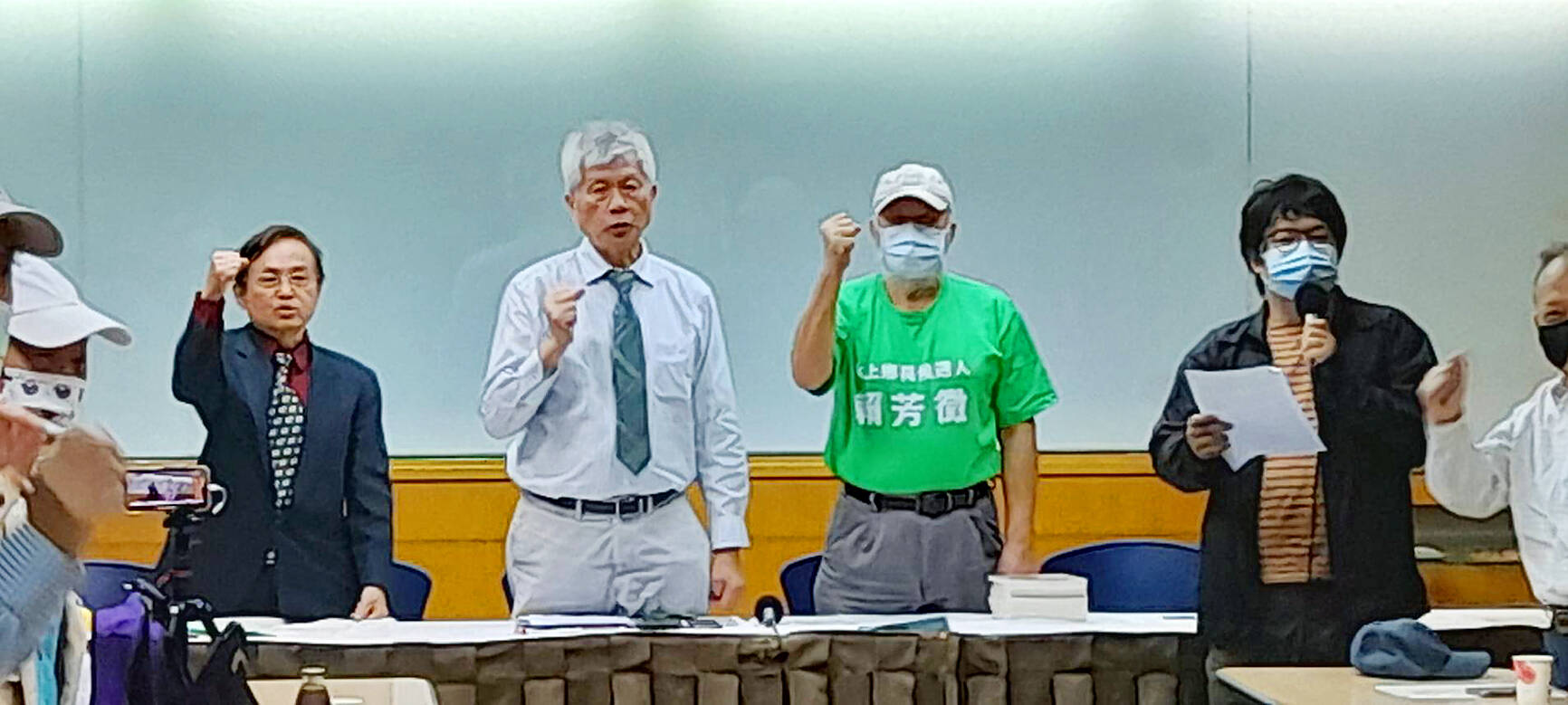Pro-independence political parties and affiliated groups yesterday formed an election alliance through which they seek to endorse candidates who pursue the alliance’s goal: to have the Constitution replaced with a new one that reflects Taiwan’s de facto independence.
At the alliance’s inauguration in Taipei — organized by Raymond Chuang (莊勝津), a California-based activist — members presented stickers that they said would be used to certify candidates who pursue the goal.
“We are all brave Taiwanese here and we should have courage to demand that a new Taiwanese nation be built,” Chuang said. “It is time that the ‘Republic of Taiwan’ replaces the Republic of China [ROC].”

Photo: Jason Pan, Taipei Times
Candidates endorsed by the alliance would strive for the replacement of the “obsolete” ROC framework, he said.
“So far no candidates running in next month’s regional elections for the two main parties — the Democratic Progressive Party (DPP) and the Chinese Nationalist Party (KMT) — have gained endorsement,” he said.
This might be because of pressure from within the parties, he added.
“If some of them have the courage to make a declaration [that they seek to replace the Constitution], we welcome them to join our movement,” Chuang said.
So far, county councilor candidates from the Taiwan Statebuilding Party and the New Power Party, as well as Lai Fang-cheng (賴芳徵), who is running as an independent in the mayoral race in Chiayi County’s Shueishang Township (水上鄉), have gained endorsement, Chuang said.
Lai — “a veteran of social movements” — is director of the Taiwan Independence Reformation Association and a former director of the Alliance of Plebiscite for Protecting Taiwan.
Lai said he is facing a tough race, as the DPP’s and KMT’s mayoral candidates in the township have more resources than him, including campaign trucks, and funds to set up large billboards, print pamphlets, and hire aides and staff to organize rallies and daily canvassing.
“Standing for election at the local level has made it even more clear that money talks in Taiwanese elections; you need tonnes of it,” he said, adding that this might lead to cash-strapped candidates assuming office, making them susceptible to corruption.
Before his campaign had even started, he had to deposit NT$120,000 to enter the township mayoral race, Lai said.
Township mayoral candidates and county councilor candidates often spend “millions of New Taiwan dollars” on their campaigns, he said.
This sum might rise 10-fold for those running for a seat in the legislature, and 100-fold for those running for city mayor or county commissioner, he added.
“Most candidates of the major parties, especially outside large cities, need to generate return on their investment so that they can run in the next election,” he said.
Free Taiwan Party founder Tsay Ting-kuei (蔡丁貴), Free Taiwan Party Chairman Lo Yi (羅宜), Taiwan Independence Party Chairman Peter Ku (古文發), Taiwanese National Party member Ted Lau (劉重義), Taiwanese-American independence advocate John Hsieh (謝鎮寬), Taiwan Republic Office Director Chilly Chen (陳峻涵) and delegates from the Nation-Building Forum and the Taiwan New Constitution Foundation also spoke at the event.

South Korean K-pop girl group Blackpink are to make Kaohsiung the first stop on their Asia tour when they perform at Kaohsiung National Stadium on Oct. 18 and 19, the event organizer said yesterday. The upcoming performances will also make Blackpink the first girl group ever to perform twice at the stadium. It will be the group’s third visit to Taiwan to stage a concert. The last time Blackpink held a concert in the city was in March 2023. Their first concert in Taiwan was on March 3, 2019, at NTSU Arena (Linkou Arena). The group’s 2022-2023 “Born Pink” tour set a

CPBL players, cheerleaders and officials pose at a news conference in Taipei yesterday announcing the upcoming All-Star Game. This year’s CPBL All-Star Weekend is to be held at the Taipei Dome on July 19 and 20.

The Taiwan High Court yesterday upheld a lower court’s decision that ruled in favor of former president Tsai Ing-wen (蔡英文) regarding the legitimacy of her doctoral degree. The issue surrounding Tsai’s academic credentials was raised by former political talk show host Dennis Peng (彭文正) in a Facebook post in June 2019, when Tsai was seeking re-election. Peng has repeatedly accused Tsai of never completing her doctoral dissertation to get a doctoral degree in law from the London School of Economics and Political Science (LSE) in 1984. He subsequently filed a declaratory action charging that

The Hualien Branch of the High Court today sentenced the main suspect in the 2021 fatal derailment of the Taroko Express to 12 years and six months in jail in the second trial of the suspect for his role in Taiwan’s deadliest train crash. Lee Yi-hsiang (李義祥), the driver of a crane truck that fell onto the tracks and which the the Taiwan Railways Administration's (TRA) train crashed into in an accident that killed 49 people and injured 200, was sentenced to seven years and 10 months in the first trial by the Hualien District Court in 2022. Hoa Van Hao, a